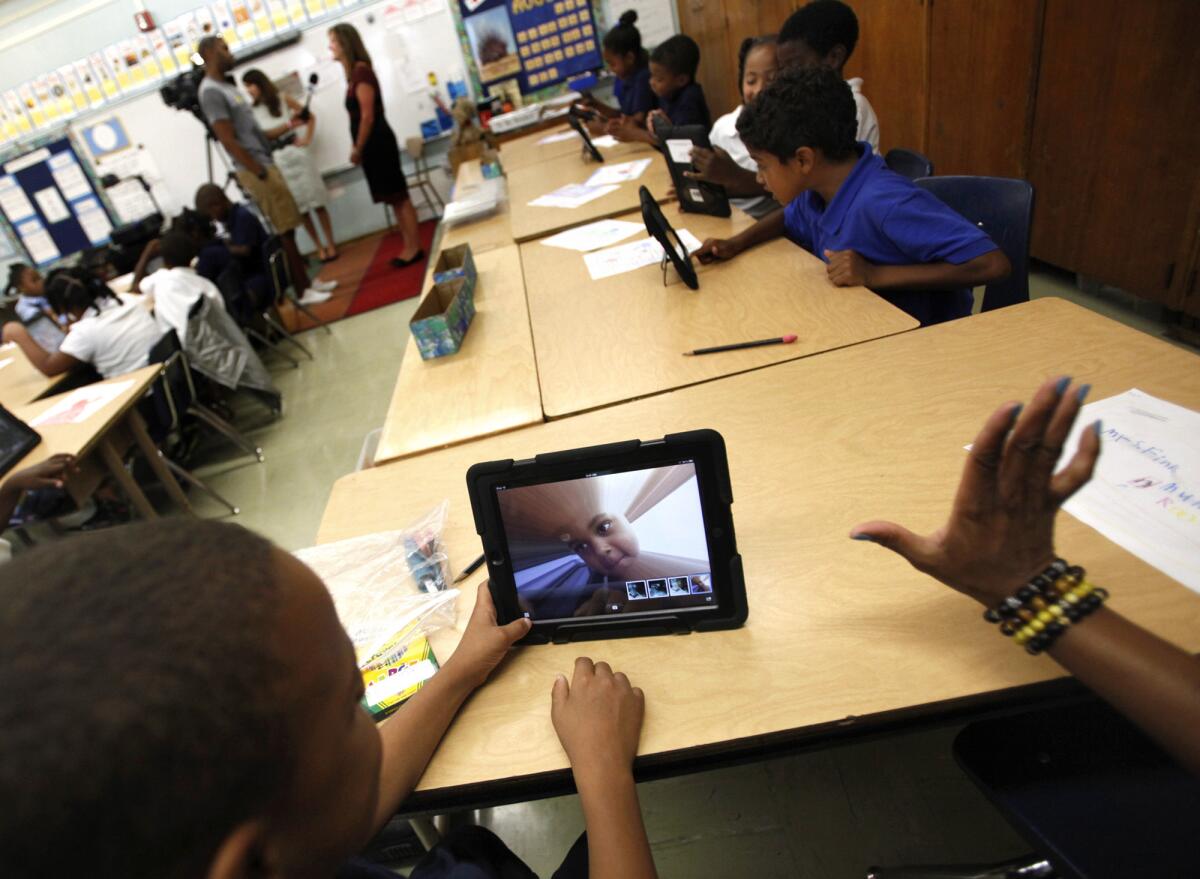Editorial: Deasy drops the iPads, but that doesn’t solve the problem

- Share via
After two investigations, reviewed by three entities, the public is left with more doubts and unknowns than ever about the billion-dollar project to equip every student in the Los Angeles Unified School District with an iPad. The plan, which was initially supported by the school board but then scaled back and revised after various problems emerged, now has been suspended by Supt. John Deasy, the main force behind the ambitious and controversial idea. The suspension came after revelations that Deasy and his top deputy had close communication about the project with both Apple and Pearson two years before those companies emerged as the winning bidders on the contract.
The suspension of future iPad purchases doesn’t resolve the problem. Deasy cannot allay the concerns raised in a leaked draft report by the district’s technology committee, headed by board member Monica Ratliff, simply by backtracking on his once wholehearted enthusiasm for the Apple-Pearson contract. Possibly, as Deasy says, his early discussions with the companies were solely about a small pilot project — in which case he must answer questions about how small a pilot and whether other companies were given the same opportunity. If there was nothing wrong with those communications, there would be no need to cancel future purchases.
Or perhaps Apple and Pearson were indeed given the inside track on the $500-million purchase (half of the $1-billion was for devices and software, the other half for upgrading campus Internet capacity). If that’s the case, he owes the district and the taxpayers much more than a commitment not to go ahead with the purchase.
The revelations sound troubling, but at this point it is important to remember that the draft report has not been finalized to reflect responses from those who have received it, or released in its entirety, nor has Deasy provided a full reply to it. Some of the findings might suggest the appearance of conflict of interest, but not actually add up to misconduct.
The next steps should be to quickly wrap up the final report, and for both the technology committee and Deasy to provide full and public explanations of exactly what transpired during the discussions and the bidding process. The district’s inspector general, who already investigated the purchase, now is reportedly considering delving into the matter again. That’s a good idea, but if the revelations do indicate a deeper problem with the bidding process, the inspector’s office should be asking why it didn’t find this information the first time around. Obviously, if there were improper interactions between Deasy, his former deputy superintendent, Jaime Aquino, and the two companies, the district attorney’s office should review the matter a second time. Critics of the Apple-Pearson contract were suspicious from the start because Aquino, who has since left L.A. Unified, had previously worked for an affiliate of Pearson.
The disclosure of the draft report comes at a fraught time for Los Angeles Unified. Political divisions between Deasy’s supporters and detractors are at a high pitch. A newly elected member, George McKenna, is joining the board, and veteran board member Tamar Galatzan, who generally backs Deasy, has called for a separate investigation into why the district’s new student-data management system has been riddled with problems. Ratliff has been more prone to question the superintendent’s initiatives.
Those divisions, and the public outcry over both of the controversies involving district technology, will make it harder for L.A. Unified to get to the bottom of the iPad matter in an unbiased way. The iPad purchase has been controversial not just because the original proposal called for granting the entire contract to Apple and Pearson, but because of the huge expenditure of bond money for expensive devices that some people viewed as unnecessary. Indeed, there have been troubling aspects to this purchase all along, including the high cost per iPad and questions about responsibility for lost or damaged devices.
Yet Deasy has been right about one thing: L.A. Unified’s students should have access to the same technology that more advantaged students in other school districts enjoy. If there were inappropriate aspects to the procurement process, they must be addressed and those involved held accountable. But it is equally vital for the board to continue its commitment to finding the right technology at the right price. Any political fallout should not interfere with the educational goal.
Follow the Opinion section on Twitter @latimesopinion
More to Read
A cure for the common opinion
Get thought-provoking perspectives with our weekly newsletter.
You may occasionally receive promotional content from the Los Angeles Times.










